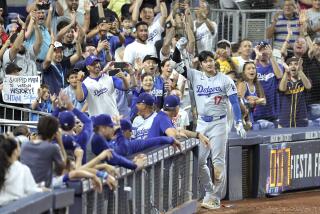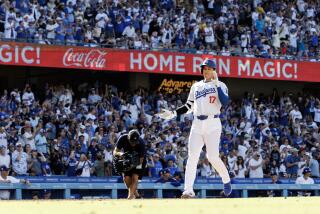BASEBALL / ROSS NEWHAN : The Timing May Be Right for Mariners
TEMPE, Ariz. — After 14 years of what can only be called a nightmare, the Seattle Mariners loom as a sleeper of another kind.
Analyzing the four divisions on the eve of the 1991 openers, the Mariners appear to be the one longshot with the best shot at an upset.
All they have to do is end the Oakland Athletics’ three-year reign in the American League West--and produce their first season at .500 or better.
Isn’t it time?
“It’s time we start thinking and acting like a winner, a contender, rather than a team struggling to get to .500,” Manager Jim Lefebvre said as he made final preparations for Tuesday night’s season opener against the Angels in Seattle.
“What good does .500 do except to leave us 26 games out of first place? We’ve got to get that .500 mentality out of our system and go right to the next level.”
Lefebvre and others think it’s a feasible jump because of the quality of a young rotation that many consider the most promising in baseball.
“Our pitching gives us a chance to win every day now,” Lefebvre said.
“All we have to do with the type pitching we have is catch the ball and score some runs. We can compete with anyone in the league if we do that.”
Said Dick Williams, the former Seattle manager who scouted the Cactus League for the San Diego Padres: “I haven’t seen a better rotation. Their starters are outstanding. I love their pitching.”
The names heard most often are those of Erik Hanson, 25 years old and 18-9 last season; Brian Holman, 26 and 11-11; and Randy Johnson, 27 and 14-11.
They will be rejoined this year by the 27-year-old dean of the rotation, Scott Bankhead, who was 14-7 in 1989 but pitched only 13 innings last season before having shoulder surgery.
The fifth starter will be a 26-year-old farm product, Rich DeLucia.
Opponents hit only .239 against the Seattle starters last year, and the Mariner staff led the league in strikeouts and was third in earned-run average.
Between July 8 and Sept. 1, Seattle starters pitched 7 1/3 innings or more in 46 of 50 games, compiling a 2.83 earned-run average, but woeful support contributed to a 23-27 record, ruining the possibility of a breakthrough season. The Mariners were 60-60 on Aug. 18, the latest they had ever been at .500, but they finished 77-85.
“Every year, people talk about the Mariners being at this or that point of development, but we’re beyond that,” Lefebvre said. “We’re through being a developmental team. We’re a contending team.”
If the Mariners are to make that a reality, Lefebvre said, they have to avoid an injury wave similar to the one in 1990, when they used the disabled list 15 times.
“We also need to have everyone play to their potential, execute better on defense and do a better job in the area of situational hitting,” Lefebvre said. “We were not a good fundamental team last year.”
Unfortunately for the Mariners, they will open the season under an ominous cloud. Relief ace Mike Schooler, who missed the final six weeks of the 1990 season with an inflamed shoulder tendon, is back on the disabled list with a biceps problem.
Lefebvre will use Bill Swift and Mike Jackson, who combined to save nine games last year, in the closer role, but he will ultimately need a healthy Schooler, plus right-handed power from the long-touted Jay Buhner.
The manager arrived in the spring of 1989 and turned the struggling Mariners into “Lefebvre Believers” with his daily motivational speeches.
Now he is in the last year of a three-year contract, and there is already an undercurrent of speculation regarding his status.
“We knew we had to come in and change the attitude immediately,” said Lefebvre, who has been handicapped by the underfinanced nature of a Seattle operation that generates less income than several clubs dole out for player salaries.
“We knew we had to let people know what was expected of them, and we also knew we’d need a couple years to sort out who can play and who can’t,” Lefebvre continued. “I feel we’ve come a long way. I mean, we’re past the point of the manager delivering motivational speeches.
“We have to stand up and perform now, and when I talk about the team being a contender, I’m doing it because I believe it and feel it’s in the best interest of the team, not because I’m in the last year of my contract.
“There’s going to be speculation about any manager in the last year of his contract, but I don’t feel it’s an issue. I’m very comfortable with the support I’ve had from the owner (Jeff Smulyan) and general manager (Woody Woodward), and I want the team to stay focused, which it can’t if I’m worried about my position.”
And after all, there’s a bottom line to it, Lefebvre added.
“If we stay healthy and still fail to play to our capability, to contend, I shouldn’t be the manager anyway,” he said.
FREEWAY JAM
The Dodgers and the Angels play the final game today in the only Freeway Series the Southland will see this year. That’s not to say that the two clubs won’t be interesting, or that they won’t come close. It’s just that both have too many questions to predict victory in their respective divisions.
The Dodgers: Can anyone really say how the rotation will perform aside from the expected effectiveness of Ramon Martinez and Tim Belcher? Can Alfredo Griffin and Juan Samuel really plug the middle? What about the durability and consistency of the bullpen? Will the chemistry prove explosive amid the heat of summer?
The Angels: What about the depth and reliability of the bullpen? Will Luis Sojo prove ready? Can Junior Felix adequately cover the acreage between Dave Winfield and Luis Polonia? Will Gary Gaetti’s two-year power and batting average slide continue? Will Winfield and Dave Parker, the 39-year-old Twin Creaks, as San Bernardino Sun reporter Mike Terry calls them, still be standing in August?
Here’s how they’ll finish:
American League West: 1--Oakland, 2--Chicago, 3--Angels, 4--Kansas City, 5--Seattle, 6--Texas, 7--Minnesota.
Comment: The A’s may be showing signs of vulnerability, but that nucleus of Rickey Henderson, Jose Canseco, Mark McGwire, Dave Henderson, Dave Stewart, Bob Welch and Dennis Eckersley is still the division’s strongest.
American League East: 1--Toronto, 2--Boston, 3--Baltimore, 4--New York, 5--Detroit, 6--Milwaukee, 7--Cleveland.
Comment: The underachieving Blue Jays, having finished two games back in 1987, ’88 and ‘90, will be less apt to beat themselves with Roberto Alomar at second base, Devon White in center field and Joe Carter in left field.
National League West: 1--Cincinnati, 2--Dodgers, 3--San Francisco, 4--San Diego, 5--Atlanta, 6--Houston.
Comment: Those Nasty Boys in the bullpen and the quality of the rotation separates the Reds from the potentially explosive Dodgers and the potent Giants.
National League East: 1--Pittsburgh, 2--Chicago, 3--New York, 4--Montreal, 5--St. Louis, 6--Philadelphia.
Comment: Yes, Sid Bream is gone, and the Pirates face an incendiary situation involving the financially dissatisfied Barry Bonds and Bobby Bonilla, but they retain a strong rotation, a powerful offense and a dynamite manager, and until George Bell proves he can cope with the Wrigley Field wind and the Cubs demonstrate that their rotation is physically sound, their bandwagon will carry one less believer.
WHO’S WHO
One of the unusual aspects of the 1991 season is that several of the most touted young players will not qualify for the rookie awards because they exceeded the at-bats or innings-pitched limits last year.
Among them are White Sox first baseman Frank Thomas and pitcher Alex Fernandez, Ranger outfielder-designated hitter Juan Gonzalez, Tiger third baseman Travis Fryman, Royal center fielder Brian McRae, Oriole catcher Chris Hoiles, Expo pitcher Chris Nabholz and the Angels’ Sojo.
Among the bona fide rookies to watch are Cardinal outfielders Ray Lankford and Bernard Gilkey, A’s pitchers Kirk Dressendorfer and Steve Chitren, Angel pitcher Scott Lewis, Red Sox shortstop Tim Naehring, Cub third baseman Gary Scott, Yankee outfielder Hensley Meulens, Giant catcher Steve Decker, Royal second baseman Terry Shumpert, Blue Jay outfielder Mark Whiten and Red pitcher Chris Hammond.
Four rookies who were expected to play prominent roles but failed to make opening-day rosters: Red Sox first baseman Mo Vaughn, Mariner first baseman Tino Martinez, Phillie second baseman Mickey Morandini and Dodger shortstop Jose Offerman.
MORE BO
Bo Jackson said in last Wednesday’s news conference that he selected the White Sox for his comeback attempt because he wanted to play for a winner and remain in the American League, giving him the chance to haunt the Royals.
Two other factors that sources said were vital: (1) The potential exposure he would receive on WGN-TV; and (2) the opportunity to operate out of the same city as Nike’s other leading pitchman, Michael Jordan.
On the day after the announcement, White Sox orthopedist James Boscardin reflected on his optimistic findings and said by phone: “We could be wrong, absolutely. Could you tell me what the stock market is going to do six or seven months from now? No one can say at this point that a successful comeback is a foregone conclusion.”
The delicate, intangible factors that are chemistry and team balance contributed to Chicago’s surprising success last year. The White Sox won 94 games, 25 more than in 1989, and as Manager Jeff Torborg has said, “We didn’t out-stat anyone.”
Is he now concerned that the microscope under which Jackson will continue his rehabilitation might prove to be a distraction, upsetting the White Sox chemistry?
“No, our club won’t be affected,” Torborg said. “We don’t have a bunch of guys on ego trips. They don’t worry about guys hogging headlines. He won’t be a distraction.”
RICKEY’S RACE
Henderson will go into Tuesday night’s season opener needing three stolen bases to tie Lou Brock’s career record. He would do it in more than 1,000 fewer games than Brock. Will the contract issue mar his performance this season?
Davey Lopes, the former Dodger base-stealing star who is now on the Ranger coaching staff and once played with Henderson in Oakland, said: “There’s an old saying that you can’t turn it on and off, but he’s the one guy I played with, the only guy I know, that can turn it on and off. That should tell you something about his ability.”
Said Brewer Manager Tom Trebelhorn, talking about Henderson from the perspective of having managed him during his first two years in the minors: “He’s always been out of the school of cool. Other teams didn’t like him, but he didn’t care. He could do things nobody else could do, and he always knew what he wanted, which was to play in the big leagues.”
More to Read
Go beyond the scoreboard
Get the latest on L.A.'s teams in the daily Sports Report newsletter.
You may occasionally receive promotional content from the Los Angeles Times.






